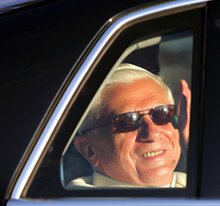"I went on a date and he didn't open the car door for me; chivalry is dead!"
"A study said women are more likely to give their seat to an elderly person; chivalry is dead!"
Folks, I am tired of hearing this. Not because it is or is not true but because one has nothing to do with the other.
Yes, really.
Offering to help someone carry a heavy object? Not chivalry. Holding a door for a woman? Not chivalry. Giving up your seat for a pregnant woman.
NOT. CHIVALRY.
Those things are courtesy.
"Courtesy: The showing of politeness in one's attitude and behavior toward others."Courtesy is derived from the Old French curteis which meant, roughly, 'acting like you are in the noble's court' or 'being on your best behavior'.
Chivalry is derived from caballerius an Old French word that meant 'mounted warrior'.
Chivalry: Bravery in war; warfare as an art; a body of knights"Chivalry traditionally had three aspects; military, religious, and social, and those three aspects were based on the Seven Knightly Virtues which are;
- Courage
- Temperance
- Prudence
- Justice
- Hope
- Charity
- Faith
- To defend the Holy, Catholic Church
- To defend the weak, the poor, the helpless, and women
- To profess your faith
- To be honest
- To be courageous
- To be temperate, just, and prudent
- To be obedient to your lord and your king
- To be chaste
So what happened? Why do modern people associate chivalry with something other than burly warriors on horseback not killing people for profit?
Wimps.
No, really. See, back in the day chivalry was the exclusive realm of professional warriors, men who had been raised and trained from birth to be the toughest, strongest, best-equipped and best-trained fighters in a tough, violent world. Like samurai, but with better armor. Chivalry bound them to act justly, honorable, and to use their military prowess to protect the innocent, not exploit them. They remained privileged above others, however, and were held in an extremely high regard.
Naturally, outsiders got jealous. Eventually some kings and other nobles created 'orders of knighthood' that weren't about warfare, or battle, or combat training; they were about rewarding people the king (or other noble) liked with the title of knight, not the substance of being a knight. The Order of the Garter, etc. all flourished and were about 'prestige within the court of the king' not 'skill on the field of battle'. It was less about channeling the violence of trained killers and all about rewarding courtiers.
Courtier is from the Old French cortoiier which meant 'someone who lives at the king's or other noble's court'.
"Courtier: A person who attends court as a friend or adviser to the king or queen"That is pretty far from 'mounted warrior'.
Now, as you can imagine that to someone who 'lived at court' courtesy was a critical skill set while chivalry had almost nothing to do with you. But - knights are chivalrous! If a courtier is knighted, shouldn't he be chivalrous? What was a perfumed man in a doublet who didn't own a horse to do?
Simple! Pretend that chivalry and courtesy are synonyms!
They aren't, of course, and thus the development of courtly love was a welcome tool in the courtier's quiver.
Courtly love was, really, a literary idea. What is now called 'courtly love' was the subject of poems, songs, and other written works for many years and really cast a strong focus on courtesy towards women as a element of courtly life. Begun in the 12th Century the ideas of courtly love were around for some time, then faded away until they were revived in the 19th Century, especially in fiction, especially in Arthurian fiction. And courtly love can be pretty gripping; lovers doomed to never be married; men wearing the colors of their lady; knights pining away because of their love for a princess they may never have; Courts of Love where women judged knights as to their adherence to the Laws of Love (similar to Courts of Honor where knights could be honored or disgraced for their adherence to the knightly code, or failure to live the knightly virtues).
This imagery, revived about 150 years ago, was almost certainly never a "real life" thing; the poems, the songs, the books - they were, roughly, the equivalent of modern romance novels - women loved them so people made them to earn a living. Like modern romance novels their connection to reality was at best tenuous. There is no evidence from histories, court cases, other writings, etc. that courtly love was every anything other than the emo music of its day.
On another, just as serious note, knighthood was a restricted class; you had to be born into the 'right class', or close enough, to be a knight. And being a knight was expensive, hideously so in today's money [imagine being expected to not only train to be a fighter pilot from the age of 9 but to provide your own fighter jet and missiles!]. Military knighthood was restricted to the upper classes. That means that chivalry, proper, virtuous chivalry, was likewise restricted to the upper classes. A peasant can't be chivalrous.
This was another reason the poets and singers loved to pretend courtesy was a synonym for chivalry; while they couldn't be chivalrous they sure as Hell could be courteous. They naturally elevated courtesy over marital prowess and eventually even over honor and justice. To be courteous was to be 'the best of men'. Of course they would say that, it was all they had! But those poems, and songs, and stories were popular with women, of course, and the revival of courtly love literature likewise emphasized it because it sells well.
But this is what we inherited - the conflation of 'courtesy' with 'chivalry', even though one has virtually nothing to do with the other.
